A product is the core of the business at any level. Companies must develop one that suits the target customers, especially SMBs and startups. This is because a single best-selling product can generate substantial revenue, allowing them to survive and thrive in a highly competitive environment.
However, the task is not without hurdles. Thus, every business needs a team of product managers to conduct target market research, implement the right business strategy, and manage all stages of the product life cycle (from ideation to go-to-market).
This applies to businesses in almost every key industry, particularly consumer discretionary, software, fintech, etc.

Due to their importance to the company, product managers are well-paid. According to Glassdoor, those in the US earn as much as $113252 per year on average.
Hence, if you want a lucrative career in business, product management is one of the best career paths available. Also, it is not too difficult to get started. You can kickstart your journey by taking high-quality online courses.
Still, such courses are numerous. You may be overwhelmed and unable to choose the right course that suits your preferences and budget, so I decided to write this article to pinpoint the top ones and drill deep into their pros and cons. You can then handily make decisions and start your training right away.
Affiliate Disclosure: This article from Victory Tale contains affiliate links. Through them, we will receive a small commission from our partners if you purchase or enroll in online product management courses.
Nevertheless, we always value integrity and prioritize our audience’s interests. You can then rest assured that we will present each training truthfully.
Things You Should Know
Prerequisites
All product management training included in this article has no prerequisites. You can start learning without any prior knowledge.
However, some courses will focus on specific techniques or industries, such as IT and artificial intelligence. Students who want to enroll in these courses will find some prior knowledge beneficial.
Our Criteria
Below are the criteria for the best product management courses online:
1. Become a Product Manager Nanodegree Program
This Nanodegree program from Udacity is unarguably the best option for absolute beginners to learn product management fundamentals.
Apart from its comprehensive curriculum and hands-on approach, this program features timely, personalized student support. Thus, you can ensure that you understand all topics clearly and be able to apply them in real life.
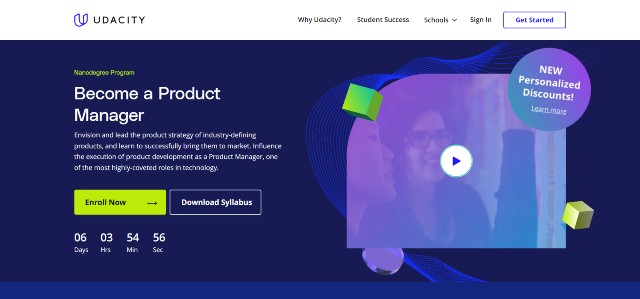
Course Content
This program comprises four minor courses as follows:
1. Product Strategy – The first course introduces product management. You will first learn about the evolution of product management and the responsibilities of the role in the company.
Subsequently, you will learn how to perform crucial tasks, such as problem identification, target market research, product vision crafting, and effective product story building.
2. Product Design – The second course will cover product design essentials. You will learn about each phase of Design Sprint: Understand, Define, Sketch, Decide, Prototype, and Validate.
Later, you will grasp the benefits of iteration and how to use it appropriately. Finally, you will evangelize the idea across development teams.
3. Product Development – The third course will discuss managing the product development process. You will learn about key concepts, methodologies, processes, and tools, particularly those related to Agile and Scrum.
The second part of the course will focus on building user stories, managing backlogs, and maintaining the feedback loop from stakeholders.
4. Product Launch – The final course is all about the product launch process. You will set up the foundational launching process, create a functional marketing strategy, prepare all the involved teams, and handle post-launch feedback.
Generally speaking, each minor course will delve into each product lifecycle process. You will then understand each thoroughly. Later, you will complete real-world projects. For example, you will run a Design Sprint and create a pre-launch process.
Upon completion, you will gain significant hands-on experience and be able to handle all the daily tasks performed by real-life project managers.
Regarding workload, you should spend 10 hours per week on the coursework, and you will complete the program in four months.
Compared to other courses, the weekly commitment is intense. However, the program is self-paced, so you can craft your study schedule.
Student Support
As mentioned above, all Udacity students will gain access to comprehensive student support as follows:
Technical Support – Udacity mentors are always available (24/7) for you to ask questions. You can use the chat interface in the Student Hub to do so.
Most students receive a reply in less than an hour, which is extremely fast by online training standards. You do not need to wait endlessly for an instructor’s response anymore.
Project Reviews – This support makes Udacity shine above its competitors. All students can submit requests for experts to review their projects. Experts will then provide personalized feedback, along with tips, techniques, and best practices that you can implement to strengthen your skills even further.
Since Udacity allows unlimited requests, you can send them anytime without worrying about wasting them before your projects reach a specific milestone. Many students find this support valuable in building a feedback loop that enhances their learning.
Career Services – If you are a college student interested in a product management career but have no work experience, this support will be highly beneficial.
The team will review your resume and optimize your LinkedIn profile to ensure they meet the highest professional standards. This assistance alone can help you secure numerous interview invitations from top companies and firms.
Pricing
This subscription costs $249 per month. Alternatively, you can choose to buy a 4-month bundle and receive a 15% discount, lowering monthly tuition fees to $211.
Moreover, Udacity offers personalized discounts for new students, plus you can use it with the bundle. Thus, it is possible to enroll in this excellent program by paying only $100 per month.
The new pricing model provides full access to the entire Udacity curriculum. Thus, you can enroll in other courses to skyrocket your skills. This is definitely a big plus!
Pros & Cons
Pros
- Unarguably the best product management online course for absolute beginners
- Taught by a team of product managers who have years of experience working at top tech companies, including Google and Uber
- Step-by-step curriculum
- Utilize a project-oriented approach, allowing students to obtain crucial hands-on experience throughout the training
- Informative lessons
- Self-paced learning
- Timely mentor support + Unlimited project reviews
- Complimentary career services are a big plus.
Cons
- Completing the program requires a high commitment. Udacity’s projects are known to be challenging.
- Costlier than other alternatives
2. Professional Certificate in Product Management
This edX program from the University of Maryland is another solid product management training program you may want to consider. You will learn each step of the product lifecycle individually and grasp how organizations can deliver products at scale.
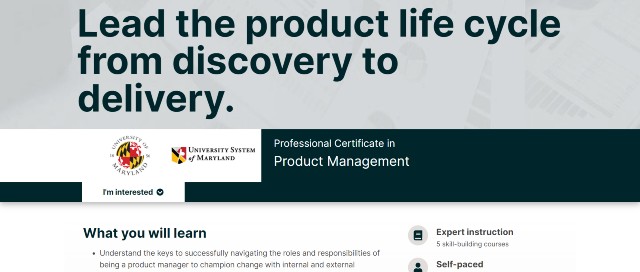
Course Content & Pricing
This program consists of five minor courses as follows:
1. Product Management Fundamentals – This first course will explore the duties and responsibilities of present-day product managers. Also, you will perceive what skills you need to become a successful product manager and overcome challenges as a product team leader.
2. Achieving Product-Market Fit – The second course will guide you through the steps of target market research. You will learn to determine your target customers, identify their needs, and define your value proposition.
Subsequently, the course will delve into the MVP (Minimum Viable Product) approach. You will specify your MVP feature set, create a prototype, and test it with customers.
3. Product Design, Prototyping, and Testing – The third course will continue from where the second left off. You will learn the basic principles of product design and prototyping. You will then perceive how to transform ideas into prototypes optimally through various tools and processes.
4. Data Science and Agile Systems for Product Management – The fourth course will explore how to utilize innovative concepts to optimize the product management process.
You will learn to implement Agile, DevOps, and Data Science to reduce risks through product loops, data analytics, and streamlined information flows. Thus, your organization will deliver the end product faster with much higher quality.
5. Modern Product Leadership – The final course will cover the leadership aspects of product management. You will learn how to lead product teams successfully to deliver compelling solutions to organizations and customers.
Generally speaking, Courses 1 to 4 cover the same content as Udacity’s Product Manager program, albeit less in-depth. However, Course 5 will replace product launch with product leadership, making it more suitable for executives or managers.
The workload is manageable. You only need to spend 2-3 hours per week, and you will complete the program in five months.
Regarding pricing, you can audit all the courses for free. However, this option will not provide access to graded assignments, projects, and a certificate of completion. You will need a verified track, which costs $895.50 one time, to do so.
Pros & Cons
Pros
- Taught by a professor who is now the CEO of a company that offers IT services supporting large government contracts
- Well-structured curriculum
- Informative video lectures with easy-to-read presentations
- Feature several projects for students to complete
- Self-paced learning
- Free auditing
Cons
- No reading materials: All course materials are video-based, quizzes, and projects.
3. Great Product Manager: Product Management by Microsoft’s PM
In this course, Dr. Bart Jaworski, a Microsoft senior product manager, will introduce you to the fundamentals of product management.
Subsequently, he will provide you with practical steps, tips, and techniques to help you land lucrative product management job offers.
Hence, this course is unarguably one of the best options for absolute beginners who want to pursue a career in this field.
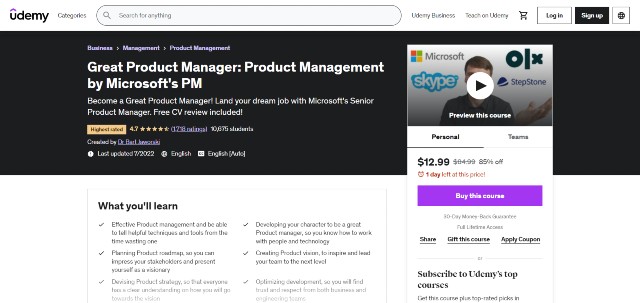
Course Content
The curriculum consists of 14 hours of video lessons covering the following topics:
- Product Manager roles and responsibilities
- Qualities of a great product manager
- Writing a product vision and strategy
- Kanban, Agile Scrum, Waterfall, and relevant work organization ideologies
- Communications with stakeholders through emails, presentations, meetings, etc. + Team/Conflict management
- Product development organization + tasks
- Live products
- The role of data in product management
- Product Manager career path
- Starting your own product
- Tips and techniques to land a product management job
- and many more
Due to its career-building focus, this course is an excellent choice for college students or those who want to switch their career paths to product management.
Apart from the lessons, you will gain access to 110+ downloadable resources, a private discord channel, and a free resume review by an instructor. Hence, you will have sufficient resources that can propel you to success.
Reviews: 4.7/5.0, Students: 10500+
Pros & Cons
Pros
- Overall, one of the best online product management courses for absolute beginners
- Taught by a senior product manager with years of experience
- Well-structured curriculum
- Clear explanations of the theoretical part of product management
- Quick communication through the Discord channel
- Include a free CV and LinkedIn profile review plus valuable career shift tips
- Lifetime access + 30-day money-back guarantee
- Inexpensive ($20 or lower when on sale)
Cons
- Some students pointed out that the course should have more practical examples.
4. Become a Product Manager | Learn the Skills & Get the Job
Created by Cole Mercer and Evan Kimbrell, this Udemy course will guide you through the entire process of becoming a product manager. You will first develop the required skills and grasp the tips that can help you secure the offer.
The curriculum gears toward software and digital products, so it may not be an optimal choice for those who want to learn “physical” or “traditional” product management.
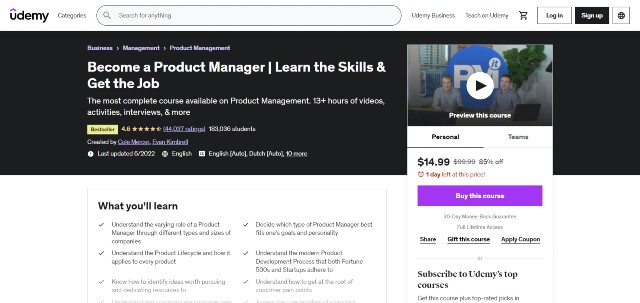
Course Content
Below are the topics that you will learn in this 13-hour course.
- Introduction to product management and development
- Ideas and user needs
- Market Research and Competitor analysis
- Customer Development
- Minimum Viable Product (MVP)
- Wireframing and Sketching with Balsamiq (wireframing software)
- Key metrics
- Project management for product managers
- Handling people and stakeholders
- Job search tips and techniques
Apart from the video lessons, this course features interviews with experienced product managers, review sheets, and quizzes. Hence, you will have everything you need to develop your skills and land your dream job.
Reviews: 4.6/10, Students: 182000+
Pros & Cons
Pros
- Another top choice for absolute beginners who aspire to become product managers
- Taught by a senior product manager and a tech startup founder, who are both passionate about teaching
- Beginner-friendly curriculum, covering various topics in a step-by-step manner
- Clear explanations of concepts
- Lifetime access + 30-day money-back guarantee
- Inexpensive ($20 or lower when on sale)
Cons
- Several students believe the content should drill deeper into advanced concepts and applications.
5. Digital Product Management Specialization
This Coursera specialization from the University of Virginia is another robust option to consider if you want to learn how to create top digital products and organize great product management teams.
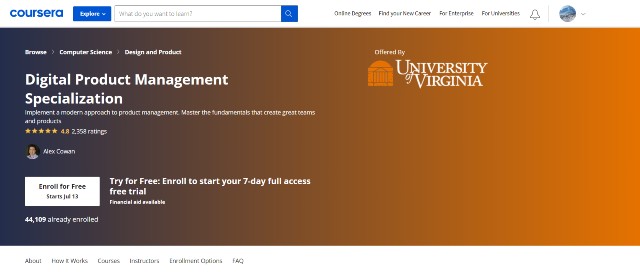
Course Content
This program consists of five following minor courses as follows:
1. Digital Product Management: Modern Fundamentals – The first course will discuss the basics of digital product management. You will learn how to create an actionable focus and use product management methods to explore new products or amplify existing ones.
2. Agile Meets Design Thinking – The second course will explain two fundamental ideologies crucial for successful product creation: Agile and Design Thinking. Subsequently, you will grasp how to combine both to create products that align with customers’ needs.
3. Hypothesis-Driven Development – This course will delve into idea testing. You will learn how to test your ideas to ensure they deliver superb usability.
4. Agile Analytics – Analytics is crucial for agile development. In this case, you will learn to perform various analytics tasks, including customer, demand, and UX analytics. Finally, you will utilize big data and machine learning to supercharge them.
5. Managing an Agile Team – The final course deepens how to manage an Agile team optimally. However, it does not focus much on tedious methodologies. Instead, you will learn about chartering your team’s focus and real-life Agile practices.
Overall, this program is suitable for managers or executives who want to get the general ideas of digital product management but do not want to bother learning too much about technical stuff.
The workload of this program is manageable. You will need to spend approximately three hours per week, and you will complete the program in five months.
You can audit all the courses for free. However, if you want to access graded/peer-reviewed assignments and a digital certificate, you will need a subscription ($79 per month.)
Pros & Cons
Pros
- Taught by a faculty member from a leading business school in the US
- Well-structured curriculum
- Clear explanations of key concepts and frameworks
- Informative video lessons covering a wide range of topics
- Include practical tips from experienced product managers
- Self-paced learning + Free auditing
Cons
- Some students believe the courses should be more in-depth.
- Several quizzes and practice questions are ambiguous. In other words, the “correct answers” are debatable.
- No reading materials (video only)
6. Software Product Management
This Coursera specialization from the University of Alberta will discuss the crucial steps of applying agile practices to create excellent software products. You will learn the key fundamentals and put them into practice by completing the capstone project.

Course Content
This program consists of five courses and one project as follows:
1. Introduction to Software Product Management – The first course will explain the role of software development and its significance. Later, you will learn about the value of each development process in creating better software.
2. Software Processes and Agile Practices – You will learn about software processes such as Waterfall and the Unified Process in this course. Subsequently, the course will guide you through crucial agile and relevant practices, including Scrum, Lean, and Kanban.
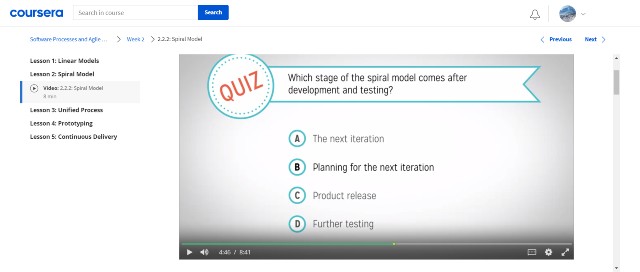
3. Client Needs and Software Requirements – Creating a product that matches client needs and requirements is unarguably the most important.
Thus, in the third course, you will learn about client interactions to draw out the most exact client needs and be able to adapt swiftly to changing requirements.
4. Agile Planning for Software Products – Successful product launches begin with robust planning. The fourth course will guide you through creating effective plans and tasks, assessing all relevant project risks, applying velocity-driven techniques, and generating accurate work estimates to spearhead software production.
5. Reviews & Metrics for Software – The fifth course is about monitoring. You will learn about techniques that smoothen the monitoring process, including sprint review meetings, the Goal Quality Metric Framework, daily scrums, etc.
6. Capstone Project – In this project, you will utilize the knowledge you have learned from the previous five courses to perform product management tasks for a hypothetical client. You will start with eliciting requirements and refining user stories.
Subsequently, you will assess risks, manage the development sprint, monitor the progress, and end by creating a functional working demo.
The structure of this program is beginner-friendly. It starts with the essential theoretical aspects and proceeds logically through product management processes. Furthermore, it offers opportunities for students to gather hands-on experience through a large-scale project.
Generally speaking, I think this program is another solid option for beginners who want to break into software product development. However, it is not a one-stop shop. You still need to take other courses or certifications to master core skills, such as Agile software development, Scrum, SQL, etc.
Auditing each course is free. Alternatively, you can subscribe at $49 per month to get the full learning experience.
Pros & Cons
Pros
- Taught by a faculty member of a leading Canadian university
- Beginner-friendly curriculum covering various key topics
- Feature a large-scale project for students to obtain hands-on experience
- Self-paced learning + Free auditing
Cons
- Some parts of the program are pretty outdated.
- Cover only the fundamentals + Students believe some crucial elements are missing.
- Lack of practical case studies in minor courses
7. Become a Data Product Manager
This Udacity Nanodegree program will give you the skills to leverage data to build the right products that match customer needs to achieve dominance in today’s competitive market.
Unlike other product management training programs on this list, this one highly recommends students have prior knowledge of basic SQL, Tableau, and data analytics.
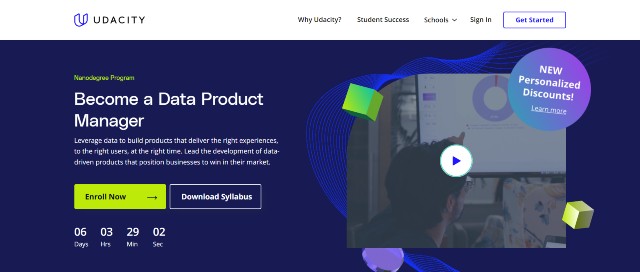
Course Content
This training program comprises three minor courses as follows:
1. Applying Data Science to Product Management – First, you will explore the role of present-day project managers in a data-oriented world. You will then grasp how you can apply data science and relevant technologies to solve problems in product management.
Subsequently, you will use Tableau to analyze & visualize data and generate actionable insights.
2. Establishing Data Infrastructure – The second course will introduce you to data infrastructure components, such as data pipelines, storage, and processing. Later, you will learn how to thoroughly evaluate and make the right decisions for the real-world data infrastructure of an organization.
3. Leveraging Data in Iterative Product Design – The final course will first explain how to choose the right KPIs for different models. Then, you will evaluate user acquisition channels and perform cohort analysis.
Later, you will learn about quantitative vs. qualitative data collection methods. You will learn how to interpret such data using statistics and apply tests to generate actionable insights.
Apart from watching video lessons, you will complete various assignments, including quizzes and real-world projects. For instance, you will develop a product proposal and a data strategy for hypothetical companies.
Such projects are pretty challenging, as it reflects the tasks for which data product managers are responsible. Completing them will earn you significant hands-on experience. You can also add them to your Github portfolio to showcase your astounding skills.
Regarding the pace, most students complete the program in two months by spending 5-10 hours per week. However, you can independently set up your schedule since the program is 100% self-paced.
Note: I noticed that the information on the course page is not detailed enough to clarify what you will learn in the program. Thus, I highly recommend downloading the course syllabus before enrolling.
Student Support & Pricing
Once you register, you will gain access to comprehensive support (as detailed in #1). The subscription fee is $399 per month, but you can purchase the bundle with personalized discounts to lower your monthly payments by as much as 70% (approximately $100 per month.)
Pros & Cons
Pros
- Taught by veteran product managers from top companies, including Zendesk and Expedia
- Well-structured curriculum
- Informative and in-depth lessons
- Project-based product management program: Each course includes a challenging real-world project for students to complete.
- Self-paced learning
- Comprehensive and timely student support
Cons
- Costlier than other alternatives
- Require higher commitment than other courses
8. Become an AI Product Manager
This Nanodegree program from Udacity covers topics entirely different from the previous programs. You will learn how to develop AI-based products, a force that kickstarts the fourth industrial revolution in the 21st century.
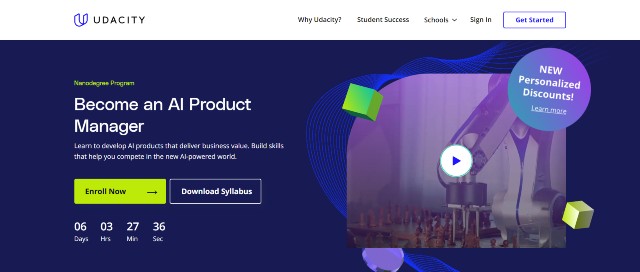
Course Content
Created in collaboration with Appen, an Australian enterprise that provides data for the development of machine learning and AI products, this program comprises four minor courses as follows:
1. Introduction to AI in Business – The first course will introduce you to AI and machine learning and how both can benefit specific business cases. Furthermore, you will also learn how to evaluate their performance and the steps to set up a robust AI product team.
2. Creating a Dataset – The second course is about creating a proper dataset and managing it for supervised learning. You will complete all the processes using Figure Eight’s data annotation platform.
3. Building a Model – You will first use Google AutoML to build functional AI models. Once done so, you will use key metrics to evaluate the performance and select the optimal model for specific use cases.
4. Measuring Impact and Updating Models – The final course will guide you on how to evaluate the business outcome of the launched AI product. Also, you will learn to create proper strategies to mitigate biases and scale the product.
In the second part of the course, you will explore the Video Annotation case study and learn how to prototype a product and successfully update a machine learning model.
According to Udacity, you should spend 5-10 hours per week and complete the program in two months at this pace.
Note: You do not need to code in the courses, although the topics may look like you have to.
Student Support & Pricing
All students can access Udacity’s comprehensive support (technical mentor support, unlimited project reviews, and career services.)
Regarding pricing, the program costs $399 monthly or $339 with the 2-month bundle. If you are a new student, do not forget to use personalized discounts to get discounts up to 70% off.
Pros & Cons
Pros
- Taught by a team of senior product managers and developers from Appen
- Step-by-step curriculum
- Clear explanations of concepts
- In-depth lessons with various course materials
- Feature three real-world projects for students to complete to obtain crucial hands-on experience
- Comprehensive and timely student support to enrich your learning
Cons
- Costlier than other alternatives
- Some product management tools from Appen are buggy.
9. AI Product Management by Duke University
This program from Duke University aims to provide training to help you successfully manage the AI product team and the product.
Upon program completion, you will be familiar with the technicals and be able to communicate effectively to AI/machine learning engineers and data scientists in your team.
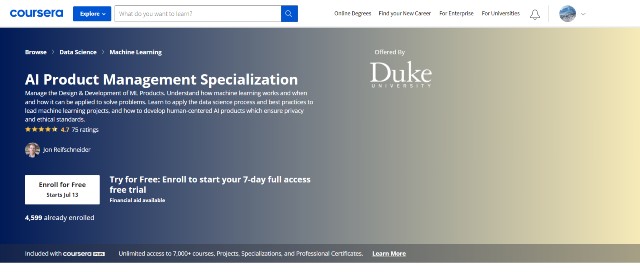
Course Content
The specialization consists of three following courses:
1. Machine Learning Foundations for Product Managers – This course will provide a no-code introduction to machine learning and relevant technologies. You will learn about each type of machine learning and algorithms and drill deeper into how they work.
Subsequently, the course will discuss the challenges of modeling and how to evaluate ML models appropriately.
2. Managing Machine Learning Projects – The second course will explain the key steps of managing ML projects effectively. You will learn to identify ripe opportunities where ML can generate value or solve issues for users.
Subsequently, you will grasp critical tips and techniques to lead the team and organize the projects.
3. Human Factors in AI – The final course delves into human involvement in AI product development. You will learn about privacy and ethical risks and understand how to tackle them.
Later, you will apply human-centric design practices to create AI products that offer top-notch user experiences and are able to augment human intelligence.
Each course includes a project. Although all the projects are far more basic than Udacity’s in terms of technical level. Thus, it may suit product managers without or limited IT experience.
Auditing each course is free of charge. However, you can subscribe ($39 per month) to access all course materials and grading.
Pros & Cons
Pros
- Beginner-friendly curriculum
- Straightforward explanations of concepts
- Feature several real-world examples
- Include as many as three projects for students to obtain hands-on experience
- Self-paced learning + Free auditing
Cons
- Some students complained that they were insufficient peers to review their projects. This is because the specialization is relatively new and has not yet become popular.
Coursera Plus
Since this article covers multiple Coursera programs, some learners may want to opt for more than one of them. If that is the case, I highly recommend subscribing to Coursera Plus.
With this subscription, you can get full access to almost all online courses and programs. Furthermore, it only costs $33.25 per month, significantly cheaper than an individual subscription that costs $39-$79 monthly.
Subscribing to Coursera Plus is thus a no-brainer, especially if you are a diligent learner.
[sc name=”coursera” ][/sc]Related Courses
Below are some of the online courses you may also find helpful for further upskilling as a product manager.
- Data Analytics
- Predictive Analytics
- Business Analytics
- Agile Methodologies
- PMP Certification
- Scrum Master Certification
- Product Management Certification – Coming Soon
- Brand Management – Coming Soon